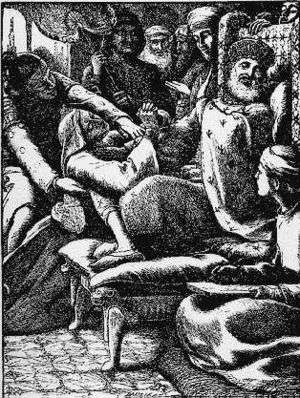Luke 18
Luke 18 is the eighteenth chapter of the Gospel of Luke in the New Testament of the Christian Bible. It records the teachings and a miracle of Jesus Christ.[1] The book containing this chapter is anonymous, but early Christian tradition uniformly affirmed that Luke composed this Gospel as well as the Acts of the Apostles.[2]
| Luke 18 | |
|---|---|
Gospel of Luke 18:37-42a on Codex Borgianus (facsimile), written In 5th century. | |
| Book | Gospel of Luke |
| Category | Gospel |
| Christian Bible part | New Testament |
| Order in the Christian part | 3 |
Text
The original text was written in Koine Greek. This chapter is divided into 43 verses.
Textual witnesses
Some early manuscripts containing the text of this chapter are:
- Papyrus 75 (AD 175-225)
- Codex Vaticanus (325-350)
- Codex Sinaiticus (330-360)
- Codex Bezae (~400)
- Codex Washingtonianus (~400)
- Codex Alexandrinus (400-440)
Parable of the Persistent Widow
This parable is also known as the Parable of the Unjust Judge or the Parable of the Importunate Widow appears only in one of the Canonical gospels of the New Testament, namely the Gospel of Luke. It tells about a judge who "did not fear God and did not respect man",[3] who is repeatedly approached by a poor widow, seeking justice. Initially rejecting her demands, he eventually honors her request to avoid being worn out by her persistence. The writer of the gospel explains that the purpose of the parable is to exemplify the importance of persistence in prayer, never losing heart.[4] It is found immediately prior to the parable of the Pharisee and the Publican (also on prayer) and is similar in to the parable of the Friend at Night.
Pharisee and the Publican
In the New Testament, Pharisees often display a punctilious adherence to Jewish Law. United Methodist theologian Joel B. Green explains that the Pharisee depicted in this parable went beyond his fellows, fasting more often than was required, and giving a tithe on all he receives, even in cases where the religious rules did not require it.[5] Confident in his religiosity, the Pharisee asks God for nothing, and thus receives nothing.[5]
On the other hand, publicans were despised Jews who collaborated with the Roman Empire. Because they were best known for collecting tolls or taxes (see tax farming), they are commonly described as tax collectors. The parable, however, does not condemn the publican's occupation (cf Luke 3:12-13), but describes the publican as one who "recognizes his state of unworthiness before God and confesses his need for reconciliation".[5] Coming to God in humility, the publican receives the mercy and reconciliation he asks for.[5]
A Blind Man Receives His Sight
Each of the three synoptic gospels tells of Jesus healing the blind near Jericho, as he passed through that town, shortly before his passion. Mark 10:46-52 tells only of a man named Bartimaeus (literally "Son of Timaeus") being present, as Jesus left Jericho, making him one of the few named people to be miraculously cured by Jesus. Matthew 20:29-34 has a similar account of two blind men being healed outside of Jericho, but gives no names. Luke 18:35-43 tells of one unnamed blind man, but ties the event to Jesus' approach to Jericho rather than his departure from there.[6]
These men together would be the second of two healings of blind men on Jesus' journey from the start of his travels from Bethsaida (in Mark 8:22-26) to Jerusalem, via Jericho.[7] It is possible, though not certain, that Bartimaeus heard about the first healing, and so knew of Jesus' reputation.[8]
See also
- Jericho
- Ministry of Jesus
- Miracles of Jesus
- Parables of Jesus
- Related Bible parts: Matthew 19, Matthew 20, Mark 10
References
- Halley, Henry H. Halley's Bible Handbook: an Abbreviated Bible Commentary. 23rd edition. Zondervan Publishing House. 1962.
- Holman Illustrated Bible Handbook. Holman Bible Publishers, Nashville, Tennessee. 2012.
- Luke 18:2: NASB
- Luke 18:1
- Joel B. Green, The Gospel of Luke, Eerdmans, 1997, ISBN 0-8028-2315-7, pp. 643-649.
- Jamieson-Fausset-Brown Bible Commentary on Luke 18, accessed 9 July 2018
- "Reflections: The blind Bartimaeus: Mark 10:46-52," October 24, 2009, The Manila Bulletin, The Manila Bulletin website, citing 365 Days with the Lord, (St. Paul's, Makati City, Philippines) from St. Paul's website (dead link), accessed October 28, 2009.
- Phyllis Kersten, "What Bartimaeus wanted: Mark 10:46-52," Christian Century, October 20, 2009, found at Christian Century website. Accessed October 28, 2009.
External links
- Luke 18 King James Bible - Wikisource
- English Translation with Parallel Latin Vulgate
- Online Bible at GospelHall.org (ESV, KJV, Darby, American Standard Version, Bible in Basic English)
- Multiple bible versions at Bible Gateway (NKJV, NIV, NRSV etc.)
| Preceded by Luke 17 |
Chapters of the Bible Gospel of Luke |
Succeeded by Luke 19 |
